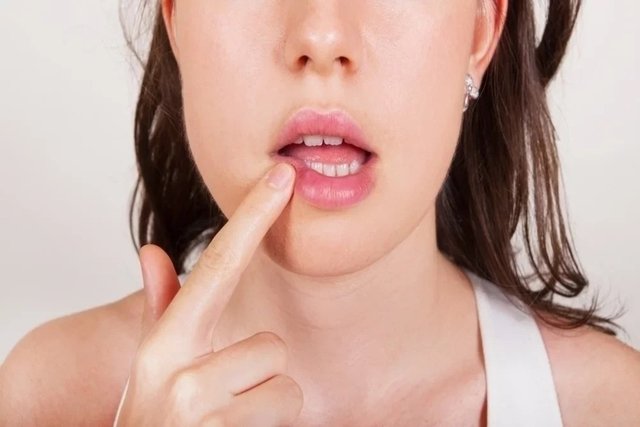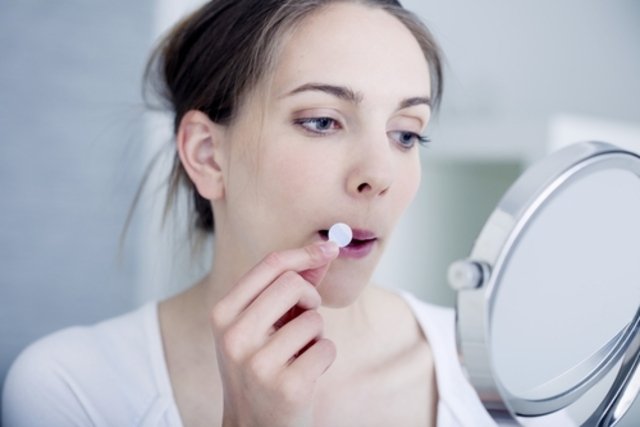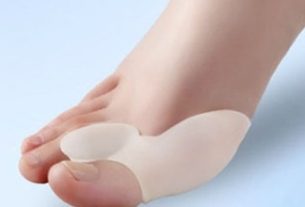To cure cold sores more quickly, reduce pain, discomfort and the risk of infecting other people, you can apply an antiviral ointment every 2 hours as soon as symptoms of itching, pain or blisters begin to appear. In addition to ointments, there are also small stickers that can cover wounds, preventing the spread of herpes and contamination of other people.
In more serious cases, where herpes takes more than 10 days to disappear, the doctor may also recommend the use of antiviral tablets to speed up treatment and prevent recurrences.
Herpes is an infection caused by the virus Herpes simplex, which has no cure and which manifests itself through painful blisters in the mouth, which last around 7 to 10 days. See more about cold sores.

How the treatment is carried out
The treatment indicated by your doctor may involve:
1. Ointments
Treatment for cold sores can be guided by a general practitioner or pharmacist and is normally carried out using ointments such as:
- Zovirax (acyclovir), which must be applied every 4 hours, for about 7 days;
- Dermacerium HS gel (silver sulfadiazine + cerium nitrate), which should be applied approximately 3 times a day, until complete healing, in case of opportunistic bacterial infections;
- Penvir labia (penciclovir), which must be applied every 2 hours, for about 4 days;
During treatment, the person must take every precaution not to contaminate anyone and, therefore, should not touch other people with their lips and should always dry themselves with their own towel and should not share glasses and cutlery.
2. Liquid dressings
As an alternative to ointments, you can use a liquid bandage on the lesion, which will contribute to healing and relief of pain caused by herpes. Furthermore, this sticker also prevents contamination and the spread of the virus and is transparent, making it very discreet.
An example of a liquid dressing is Mercurochrome’s Filmogel for Cold Sores, which can be applied 2 to 4 times a day.
3. Pills
Oral antivirals can be used in more severe cases and in immunocompromised people, who are at risk of developing complications. Furthermore, they can also be used as a long-term treatment to prevent relapses, but only if recommended by a doctor.
The most commonly used medications for the treatment of cold sores are acyclovir (Zovirax, Hervirax), valacyclovir (Valtrex, Herpstal) and famciclovir (Penvir).
4. Home remedies
Home treatments can be used as a complement to the treatment prescribed by your doctor, such as eating 1 clove of raw garlic per day, which should be started at the first sign of herpes and maintained until it is cured. In addition to this, other home remedies prepared with Jambu and Lemon Balm, for example, also help to alleviate symptoms and heal blisters in the mouth faster. See how to prepare these home remedies for cold sores.
Eating the right foods also helps to heal herpes wounds in less time. Watch the following video and see how food can help fight herpes:
How to treat recurring cold sores
In the case of recurrent cold sores, which appear more than 5 times in the same year, treatment must be carried out by applying the ointment recommended by the doctor, when you start to feel itching or burning in the lip area. To prevent herpes from appearing so frequently, it is recommended:
- Avoid excess stress and anxiety;
- Moisturize your lips, especially when it’s very cold;
- Avoid prolonged sun exposure and put sunscreen on your lips.
Although cold sores disappear completely after treatment, they can reappear several times throughout the patient’s life, especially during periods of greater stress, after prolonged periods of other illnesses, due to low immunity, or when the person is more time exposed to the sun, such as on vacation, for example.
Another way to reduce the frequency of herpes is to take a lysine capsule supplement. Simply take 1 or 2 500 mg capsules per day for 3 months, or as directed by your dermatologist or pharmacist. The capsules should be taken when the herpes sores are improving, and will prevent them from appearing again, also reducing their intensity.
Furthermore, in some cases, the doctor may also recommend treatment with oral antivirals.
Read too: Herpes: what it is, symptoms, types, transmission and treatment
What is the treatment during pregnancy?
The treatment of cold sores during pregnancy and breastfeeding must be done with caution, therefore, the woman should go to the doctor so that he can recommend a medicine that will not be harmful to the baby. A good option is to use liquid dressings, which do not have any antiviral in their composition and are equally effective, or antiviral creams, such as Penvir labia, when recommended by the obstetrician.
Furthermore, home remedies such as propolis also promote the healing of the herpes wound and help to relieve inflammation. See how to make a great homemade ointment with propolis.
Signs of improvement in cold sores appear around 4 days after starting treatment and include decreased itching, reduced redness and healing of wounds and blisters in the mouth. Signs of worsening cold sores are more common in patients who do not receive adequate treatment and include the appearance of herpes sores in other regions of the lips, inside the mouth and pain when chewing and swallowing, for example.

Sign up for our newsletter and stay up to date with exclusive news
that can transform your routine!
Warning: Undefined array key "title" in /home/storelat/public_html/wp-content/plugins/link-whisper-premium/templates/frontend/related-posts.php on line 12
Warning: Undefined array key "title_tag" in /home/storelat/public_html/wp-content/plugins/link-whisper-premium/templates/frontend/related-posts.php on line 13




